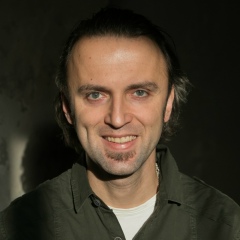Раздумья о Ла Манче…
Итак, совершилось, прошли годы… но я таки сходил на Дон Кихота в Молодежку. За это время я не раз бросал взгляд на афишу, привлекающую теплой белизной декораций… Но ближе к делу.
Даже по прошествии нескольких дней на моих плечах сидят бесенок и ангелок, которые ведут спор о финальной оценке. Первый говорит о том, что я был готов уйти после первого действия (а это своего рода «достижение»), второй напоминает, что я таки хлопал в конце.
Спивак и Ко пошли по давно накатанной дороге – первая часть Дон Кихота – гротеск ренессансного юмора, вторая – сборник истин. Однако здесь дело было доведено до Абсолюта. Как результат, первое действие – мало убедительное, сцены затянутые и не очень-то смешные. Сквозь нагромождение тяжеловесного ммм, ок, юмора, приходится продираться. При этом персонажи выглядят ходульными, а эпизоды, которые по идее должны предвосхищать для нас вторую часть смотрятся странно и чужеродно.
После занавеса все меняется. Складывается впечатление, что актеров (а также режиссеров и сценаристов) подменили. Даже комедийные, в духе первого действия, сцены стали короче и увереннее. Санчо и Дон Кихот получают объем и оборачиваются людьми все более трогательными. В конце ты действительно им сопереживаешь (и это после всего, что ты видел в первые полтора часа).
Но по выходе из зала все равно не покидает вопрос – стоило ли мучать нас весь первый акт? Ради чего? Только чтобы более очевидно показать преображение героев? Может быть, это стоило бы сделать иначе. Но, с другой стороны, ведь реально же хлопал в конце…
В общем, бесенок и ангелок продолжают спорить. Однако у первого есть преимущество. Он говорит «все неплохо – но можно лучше». Можно. Но посмотреть вполне стоит, особенно если вы любите Дон Кихота.
Итак, совершилось, прошли годы… но я таки сходил на Дон Кихота в Молодежку. За это время я не раз бросал взгляд на афишу, привлекающую теплой белизной декораций… Но ближе к делу.
Даже по прошествии нескольких дней на моих плечах сидят бесенок и ангелок, которые ведут спор о финальной оценке. Первый говорит о том, что я был готов уйти после первого действия (а это своего рода «достижение»), второй напоминает, что я таки хлопал в конце.
Спивак и Ко пошли по давно накатанной дороге – первая часть Дон Кихота – гротеск ренессансного юмора, вторая – сборник истин. Однако здесь дело было доведено до Абсолюта. Как результат, первое действие – мало убедительное, сцены затянутые и не очень-то смешные. Сквозь нагромождение тяжеловесного ммм, ок, юмора, приходится продираться. При этом персонажи выглядят ходульными, а эпизоды, которые по идее должны предвосхищать для нас вторую часть смотрятся странно и чужеродно.
После занавеса все меняется. Складывается впечатление, что актеров (а также режиссеров и сценаристов) подменили. Даже комедийные, в духе первого действия, сцены стали короче и увереннее. Санчо и Дон Кихот получают объем и оборачиваются людьми все более трогательными. В конце ты действительно им сопереживаешь (и это после всего, что ты видел в первые полтора часа).
Но по выходе из зала все равно не покидает вопрос – стоило ли мучать нас весь первый акт? Ради чего? Только чтобы более очевидно показать преображение героев? Может быть, это стоило бы сделать иначе. Но, с другой стороны, ведь реально же хлопал в конце…
В общем, бесенок и ангелок продолжают спорить. Однако у первого есть преимущество. Он говорит «все неплохо – но можно лучше». Можно. Но посмотреть вполне стоит, особенно если вы любите Дон Кихота.
Thoughts on La Mancha ...
So, it happened, years passed ... but I did go to Don Quixote to Molodezhka. During this time, I repeatedly glanced at the poster, which attracts with its warm whiteness of the scenery ... But closer to the point.
Even after several days, a demon and an angel sit on my shoulders, who argue about the final assessment. The first one says that I was ready to leave after the first action (and this is a kind of “achievement”), the second one reminds me that I clapped at the end.
Spivak and Co. went along the long-drawn road - the first part of Don Quixote is the grotesque of Renaissance humor, the second is a collection of truths. However, here the matter was brought to the Absolute. As a result, the first action is a little convincing, the scenes are long and not very funny. Through a heap of heavyweight mmm, ok, humor, you have to wade. At the same time, the characters look stilted, and the episodes, which in theory should anticipate the second part for us, look strange and alien.
After the curtain, everything changes. It seems that the actors (as well as directors and screenwriters) have been replaced. Even comedic, in the spirit of the first act, scenes became shorter and more confident. Sancho and Don Quixote gain volume and turn into people more and more touching. In the end, you really empathize with them (and this is after everything that you saw in the first half hour).
But after leaving the hall, the question still doesn’t leave the question - was the whole first act worth torturing us? For what? Just to show the transformation of the heroes more clearly? Maybe it would be worth doing otherwise. But, on the other hand, it really clapped in the end ...
In general, the devil and the angel continue to argue. However, the former has an advantage. He says "everything is not bad - but it can be better." Can. But it’s worth a look, especially if you like Don Quixote.
So, it happened, years passed ... but I did go to Don Quixote to Molodezhka. During this time, I repeatedly glanced at the poster, which attracts with its warm whiteness of the scenery ... But closer to the point.
Even after several days, a demon and an angel sit on my shoulders, who argue about the final assessment. The first one says that I was ready to leave after the first action (and this is a kind of “achievement”), the second one reminds me that I clapped at the end.
Spivak and Co. went along the long-drawn road - the first part of Don Quixote is the grotesque of Renaissance humor, the second is a collection of truths. However, here the matter was brought to the Absolute. As a result, the first action is a little convincing, the scenes are long and not very funny. Through a heap of heavyweight mmm, ok, humor, you have to wade. At the same time, the characters look stilted, and the episodes, which in theory should anticipate the second part for us, look strange and alien.
After the curtain, everything changes. It seems that the actors (as well as directors and screenwriters) have been replaced. Even comedic, in the spirit of the first act, scenes became shorter and more confident. Sancho and Don Quixote gain volume and turn into people more and more touching. In the end, you really empathize with them (and this is after everything that you saw in the first half hour).
But after leaving the hall, the question still doesn’t leave the question - was the whole first act worth torturing us? For what? Just to show the transformation of the heroes more clearly? Maybe it would be worth doing otherwise. But, on the other hand, it really clapped in the end ...
In general, the devil and the angel continue to argue. However, the former has an advantage. He says "everything is not bad - but it can be better." Can. But it’s worth a look, especially if you like Don Quixote.

У записи 3 лайков,
0 репостов.
0 репостов.
Эту запись оставил(а) на своей стене Константин Крылов























